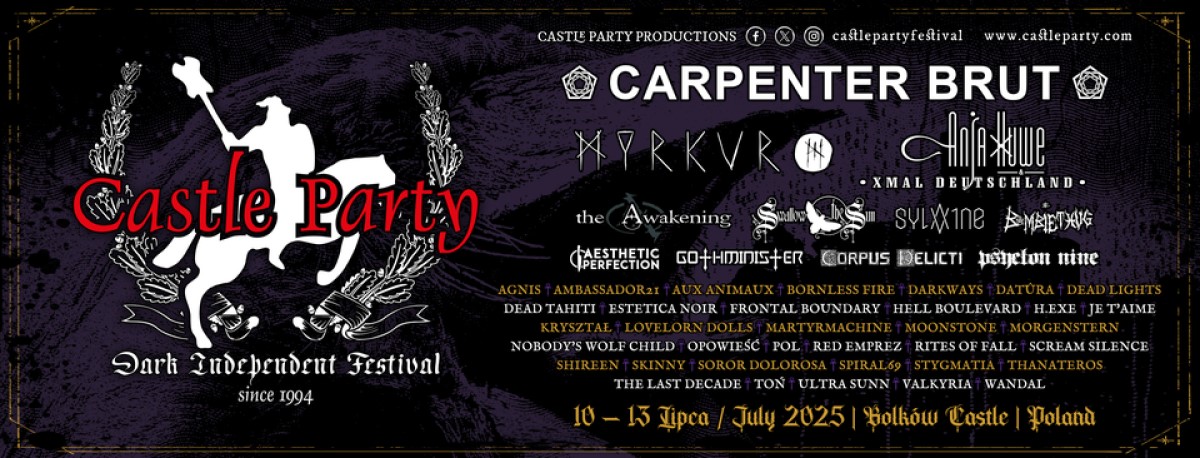Therion, the grand masters and legends of symphonic metal, with over 35 years under their belts, need no introduction. The band around mastermind Christofer Johnsson was one of the first to combine metal with symphonic and orchestral elements back in the 90s and is today considered one of the most style-defining founders of symphonic metal. Albums like Theli (1996) and Vovin (1998) are considered true masterpieces and monumental genre-defining albums, which, to this day, didn't get an equal opponent. Now, the band continues its legacy by releasing the Leviathan trilogy. The latest one, Leviathan III, released in December 2023 via Napalm Records, is a versatile and style-combining musical journey - formed by the fundamental line of its predecessors, Leviathan and Leviathan II. As almost always, advancing melodies and alluring orchestral symphonic compositions are combined with rock elements, captivating lyrics and choir parts. On 9 March, Therion stopped in the nearby Revolver Club (San Donà di Piave, Italy) as a part of its expansive Leviathan Tour 2024 and offered an outstanding performance (the report is HERE). Before the show, we had a long conversation with Therion's mastermind, Christofer Johnsson, who spoke in depth about the band, albums, live shows, touring, and even the music industry, and shared some facts from the past, plans and much more. Here is probably the most extensive interview Terra Relicta has ever done, and yet too short. Namely, Christofer Johnsson is a musical phenomenon, a self-taught musician who composes music for an entire orchestra!
Interview with: Christofer Johnsson
Conducted by: Jerneja, Tomaz
Edited by: Jerneja
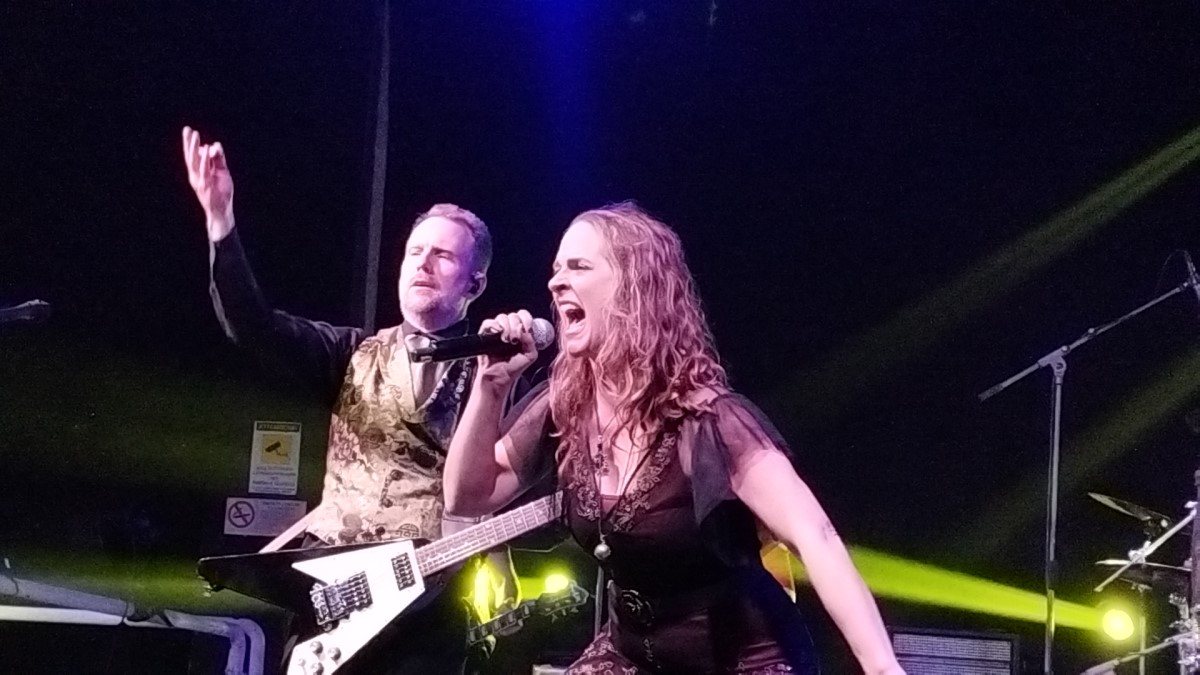
Jerneja: Hello, Christofer! How is the tour going so far?
Christofer: It's good to tour Europe again - good crowds, but difficult to compare it with touring other continents because it's a totally different level. We came from Mexico, where we played at a stadium in front of 11000 people, and now we are playing in small clubs in front of a much smaller audience. The lowest was somewhere in Germany, where we played for 150 people. It's like a roller coaster. One day, you have a luxury hotel like we had in Bulgaria, and the next day, a cold backstage room full of mould, so you can't even close the door to the bathroom and stuff like that. One day, you get amazing food and want to kiss the chef, and the next day, you get something like school food went wrong. But that's how the touring is. It's always like a roller coaster; unless you are a band on a stadium level, it will be ups and downs. The main thing - and that's why we are here - is that the crowd is good. We are here to play music, and every day, those two hours we play are really good.
Jerneja: Playing 20+ songs every night must also be quite exhausting, and with this tour, you have a long way to go, all the way to China...
Christofer: Yes, but playing is the highlight of the day. The other parts of the day look like sitting backstage and staring at the wall, trying to get the shitty internet to work, sitting in the bus and looking through the window, or watching some crap on Netflix if you are up for it. One of the reasons that we cut down on touring is precisely that. I could do 200 shows a year if I could teleport myself from home to stage, but all the travelling, waiting,... is so very boring.
Jerneja: Maybe someday, it will be possible to teleport...
Christofer: Haha, yes, maybe. Either way, we will cut down brutally on touring in future. On this tour, we want to cover up as much as possible. We do 31 shows in Europe now; it could be more if we also did the UK and Scandinavia. I guess, in the future, we will do maybe a week in Europe. We will go on tour only after every second album. We will do an album, then no touring at all, and then after the next one, we will do a little bit of touring.
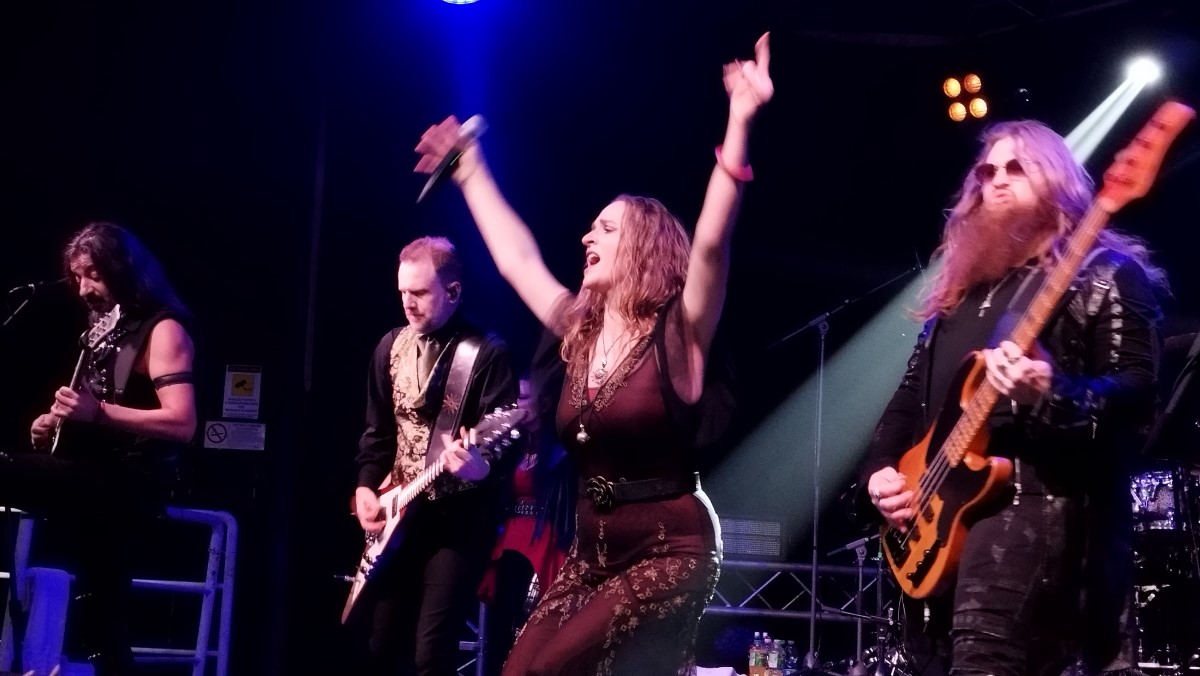
Jerneja: On this tour, you will skip Slovenia with your performance, namely from Italy, you will go straight to Croatia. Is it because, after your last performance in Slovenia in 2018 - due to a dispute with the promoter - you said that you would not perform in Slovenia again?
Christofer: Oh, I don't know any more about that. You can always get another promoter. You don't go to one certain country because you don't like the promoter, you simply won't work with that one. That's another thing. If you have the audience, and if you have a good promoter, you go, but if you have only one promoter and that one is shit, that's a reason for the booking agent not to work with them. I don't think anything bad happened. So far as I remember, the problem was with the merch thing in both countries, Slovenia and Croatia. But there are so many places where you can play. Recently, when I was wasting some of my useless time on tour by browsing on Facebook, which is worse than shooting myself right in the head, I hate it so much, but, for some reason, I opened it, and the first feed that came up was about Rhapsody Of Fire - Latin American tour, three dates! That was a Latin American tour to them. Do you know how many shows we can do there? We did at least 24 on our last two tours there but could easily do 30 to 35. So, we tour quite a lot. It's just that we tour in other places. We tour a lot in Latin America and Europe, plus, in 2018, we did five shows in China. We were supposed to do five shows this time also, but there were some local problems with permissions. You can't just book a concert there; you need many permissions. If you go to China, you need to send your setlist in advance, all the lyrics, and they check it and need to approve it. Metallica, for example, wasn't allowed to play "Master Of Puppets" because you can read double messages in the lyrics. It can happen that you don't get permission for any reason, so we got just three shows instead of five. We did 58 concerts in Europe alone in 2018. We will go from one of the most touring bands into one of the least touring ones. I'm becoming tired of touring, not playing live, because we have a really good time every night on the stage - it's just that the rest of the day is crap.
Tomaz: You also performed with and released albums with orchestra. How do you like to work with an orchestra?
Christofer: Generally, I don't like it because they are bad, haha. They don't perform well with a band. The one in Mexico was actually surprisingly good. It was a nice surprise because those we worked with in Europe were not good. You also have many technical problems, so it's quite difficult to perform with an orchestra. For example, you need to have a microphone close to the violins since violins don't sound very loud, but it will catch a lot of other shit like the audience shouting, drums, brass playing loud, and so on. The electric guitar is a nightmare to mix it properly and make it work. Actually, I said no to playing with an orchestra for the next 15 years. It was my dream to do it, and when I did it for the first time, despite all the problems, I fulfilled my dream, but after that, I said no to the offers unless they gave me so much money that I couldn't refuse. Everybody has a level.
Jerneja: Is the orchestra, in principle, incapable of adapting to the band?
Christofer: To be fair, if you take a rock musician in a famous band, you put him in the orchestra and give him some score, he won't be able to play it. They will say that he should just look at the conductor, who will show him how to play, but he doesn't understand anything about the conductor. So, it's similar when you take classical musicians and say to just listen to the beat. It's not what they do. They read the score and follow the conductor. They don't listen to the beat to be tight or to the intonation of rock instruments, so it's a completely different element. In all fairness, it's very difficult, but motivation is a big factor. If you are in a symphonic orchestra but listen to rock music privately. Having an understanding of other types of music helps a lot. In the Mexican orchestra, they do it, many of them are fans of the bands, or rock fans, metalheads, some of them do other stuff, like salsa for example, and they know what groove is, they know how to listen, so it really helped and was very good. The conductor was very good as well. The whole event was so much bigger there. The one we did in Europe was like a cultural event - Therion goes classic - so we did some classical Therion songs, but it was too much in a classical environment. In Mexico, it was more like a rock event, so the people who showed up knew they could expect rock stuff.
Jerneja: What if you had your own conductor?
Christofer: There's nothing wrong with conductors. Both of them have been excellent. The best example was in Romania. You rent the whole orchestra and do not sign individual contracts. They get their payment and know they've signed with a Swedish metal band. They say: "Metal? What's that?" Then one-third of them think that it's total shit and say, "why do we even play this shit". They want to play Beethoven, Bach or Wagner, not metal. So, they don't have a motivation. Another third said they would only play because they got paid for it. They play but don't do a good job because they don't have any passion for it. The last third said it was cool and fun, and they wanted to do something different. So, if two-thirds are not motivated, it can't be good - not with any conductor on the planet. I remember the timpani player, who was so late that I complained. There was three seconds of delay in his brain, haha. He was one of those who were thinking, "why am I doing this shit". When the intendant had a good talk with him, it became significantly better, not good, but better. That was a very well-illustrated example that you can measure in seconds. That's why I don't like that.
Tomaz: Let's now talk about the Leviathan trilogy. How are you satisfied with the final result?
Christofer: It has been really good. The albums have three different characters. The first two are hits-albums, while the third is more adventurous. Obviously, the adventurous one will sell and stream less than hit songs. It's not a brainer; the whole idea with the hit songs was to become more popular. With the third one, we wanted to please those who are not into the hit songs and those who like the more adventurous side of Therion. For example, I don't think that Judas Priest's "Breaking The Law" and "Living After Midnight" are their two best songs - they are great songs but certainly not my favourite songs of theirs. I prefer songs like "Sentinel" or something like that. Similar is with Therion. When we make a hit album, there will be people who like "Son Of The Staves Of Time", "The Rise Of Sodom And Gomorrah", "Birth Of Venus Illegitima", "Lemuria", which are our most popular tracks, and with Leviathan I, we aimed at them. Leviathan III was more for those who prefer "Via Nocturna" and similar stuff to the Deggial album. Leviathan II includes songs that didn't fit any of these two records. There are some hit songs and some that are not. You can perfectly see that in the streamings. The hit songs go through the roof for being Therion, while more adventurous ones are way less streamed. We knew that, and it would be weird if adventurous ones would do as good as hit ones.
Jerneja: Probably for the same reason, there are more songs from Leviathan I in the tour setlist than from the other two...
Christofer: Well, when selecting songs, you need to choose those that are good live songs. On Leviathan III, there are a lot of songs that would be difficult to play live, like "Duende" or "An Unsung Lament", for instance. Those are typical album songs. Of course, you can perform them live; we did, for example, "Via Nocturna" live, but it didn't really work, or "Land Of Canaan" as well, which is one of my favourite Therion songs but it's not a good live song. Instead, we want to kick ass with guitar-based songs, and since Leviathan I is very straightforward, it has more potential for live songs. We will also cross off "Aeon Of Maat" from the setlist. We will do it in Europe but not Latin America because that song musically works really well, but the vocals are so very multi-layered that it can be chaotic when played live. It's also an example of a good album song that doesn't work well live.
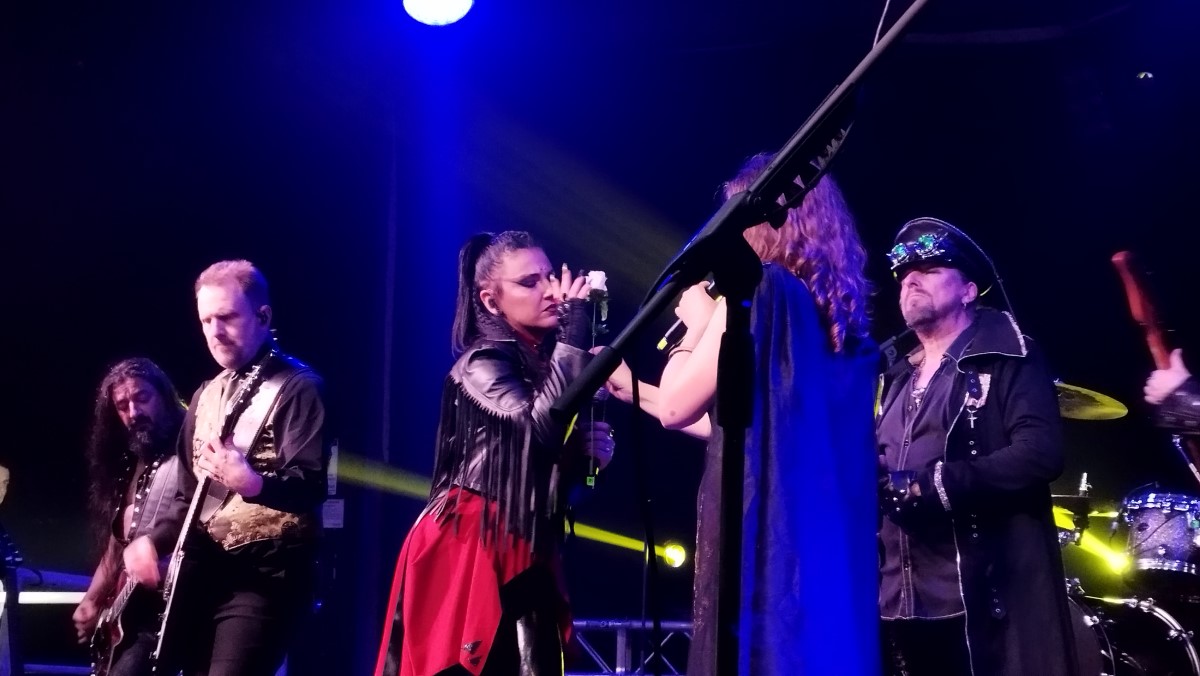
Tomaz: And what can you say about the album Beloved Antichrist? You said it would be your masterwork, but in the end, it wasn't well-accepted by your fans.
Christofer: This isn't really an album; it is the soundtrack to a stage work that was never staged. It's like if you made music for a movie that was never shot. But the plan is to stage it, and it's one of the things I will focus on after the tour. When played in Mexico, we sold out the 11,000-seat arena, which was way more than expected. We expected to sell around 8000 tickets, but we sold 11000, and there were still people in the street. Therefore, we earned a lot of money and thought, "let's do something more". So, the idea of staging Beloved Antichrist became even more interesting. We will not do a regular show with an orchestra again - that was a special event - but it opens many doors to stage Beloved Antichrist. That is an opened wound for me because that product is meant to stage it. There are things you can never understand only by listening to the soundtrack. Of course, you can read the dialogues and get an idea, but it's not the same thing, you know. The music was created for the stage thing that has been drawn. What's happening on stage? A lot of stuff is written in a very atmospheric way. It's like an opera, just like listening to opera but never seeing it live. You'll never fully understand it. You can enjoy it still, and some people enjoy Beloved Antichrist, but once you see it live, it can change your perception of music forever.
Tomaz: Did you already have a stage scenario in mind when composing the music?
Christofer: It's a rock musical, like, for example, Jesus Christ Superstar. It's like that but with opera singers and an orchestra. It's a music theatre, and the acting on stage is usually more important than the music. Sometimes, some really good music, like it was Jesus Christ Superstar, gets alive later - after people listen to it via CD or whatever. Beloved Antichrist is a stagework created for the stage. That's its purpose.
Tomaz: I've always been interested in Therion's lyrics; they are very mystical and mysterious. Though they usually have no clear message, or at least not one easily understood. Can you tell us something about the Leviathan trilogy lyrics? Is there any concept behind them?
Christofer: No, there is no concept. We just named the albums Leviathan I, II and III because they were written and recorded at the same time. The lyrics came in the same way as for any other Therion album. We make music that is more dramatic and, as such, requires something different than the usual rock'n'roll lyrics or love songs. You can't play a song like "Leviathan" and sing about drinking whiskey; it would be weird. I often work with a lyric writer who has similar interests to me, and he comes up with some suggestions.
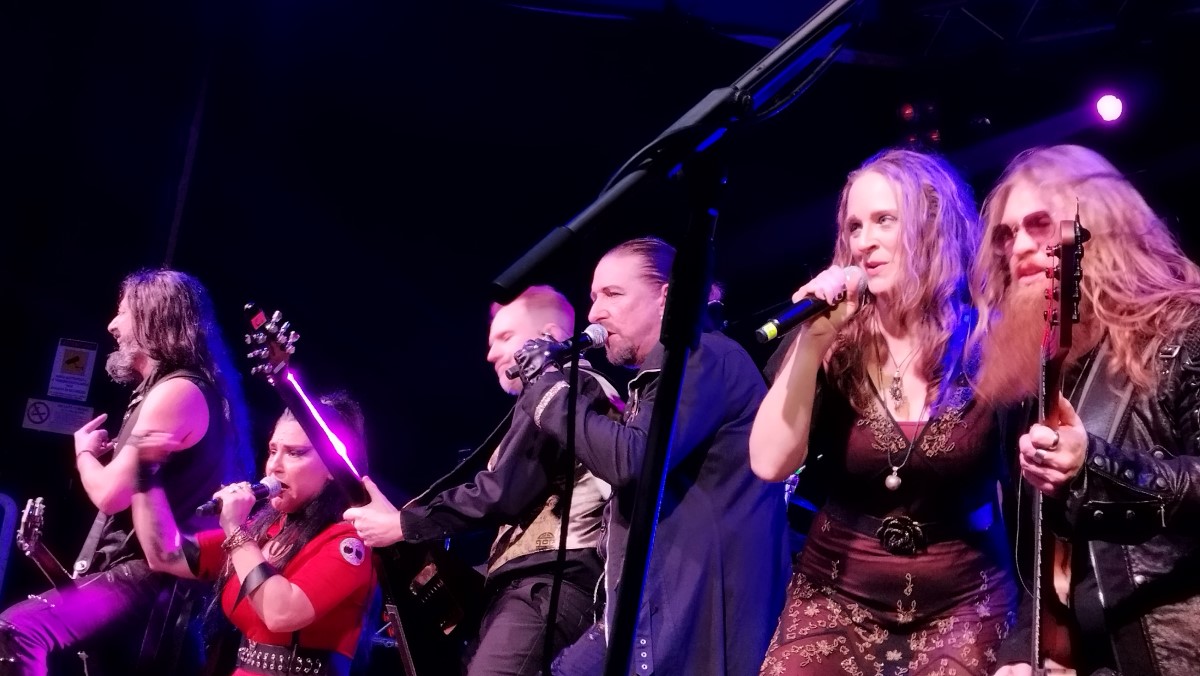
Jerneja: As long as it is a beast... Namely, Therion is a Greek word meaning "beast", and Leviathan is a sea serpent noted in theology and mythology...
Christofer: Yeah, and Vovin, in Enochian, and Theli, in Hebrew, mean dragon. We always had this kind of connotation. It's what we do - nothing particularly different this time. The only difference is that I was working before with another lyrical writer, Thomas Karlsson, and now, since Beloved Antichrist, I've been working with Per Albinsson. But otherwise, there are, as usual, different mythological concepts. The more you dig in the bucket, the more you get to the bottom. We've slowly started running out of the topics, so we'll try to widen our perspective. So, we had "Tuonela" on Leviathan I, for instance, which is related to the Kalevala, the Finnish national epic. It was a little bit of a blind spot for me since I hadn't read much of that before. Then, "Ten Courts Of Diyu" takes us into Chinese mythology and "Duende" into Spanish. There are always some areas you don't know much about, the folklore and the mythology of a certain area. Once you've done 19 albums, as we did, you start looking for new ideas.
Tomaz: Leviathan III came out via Napalm Records. How are you satisfied with your new record family, and why did you leave your long-time partner, Nuclear Blast Records?
Christofer: Well, it was a little bit of a nostalgic thing to break up with Nuclear Blast after all these years. They did a fantastic job all these years. Really, really good job, actually. I will be in eternal debt and will always show them my gratitude for the commitment and effort they've put in for Therion. There was a bit of a shift when Believe Digital bought Nuclear Blast. Partly, many people with whom we worked since the 90s disappeared, some formed another label, Atomic Fire Records, and were replaced by other people. Some of the new people were awesome, but some... I didn't like to work with them that much. The thing is that when Nuclear Blast got a new owner, Believe Digital - a streaming platform, a digital distributor, which already owns many things. And since its business is streaming, there is not much interest in physical releases. Of course, they bought a record label and want to squeeze out what they can, but still, physical is not their priority. When vinyl was booming, many labels, like Napalm Records or Atomic Fire, bought their own vinyl pressing plants because pressing times became ridiculous. On the other hand, Nuclear Blast, who had so much money, didn't do that. When I gave them the master tape for Leviathan II, I guess it was around the new year 2022, they said they could set the release date in September. That meant nine months! It was because of the vinyl, and completely absurd. A couple of months later, they said that the pressing plant couldn't deliver it on time, so they needed to push it in October, and at the time of release, the vinyl wasn't even ready. It came one month later. They needed 11 months, almost a year, and this is totally unacceptable. They thought that fans would buy it anyway later on. You know, you have your release day, and you want to hold the record in your hands. The release date wasn't any fun; it was frustrating. That was a big thing for me. You know, I'm economically independent - I don't need to make music for a living anymore, nor do I have to play concerts. If I do so, I do it because I like it. I write music because I love music, I release it because I like sharing it, and I like to play concerts because I love to perform with my music. Emotional things for me are things like having a vinyl released at the same time as everything else. We came to the end of the road, and they thought that Therion had become a little bit too expensive because we had a deal from the old times when you sold mostly physical albums. The advance they pay for royalties and production costs - normally comes back in three months of sales because 90% of records, as an established band, you sell in the first three months. Regarding the streaming, you need to look for 15 years in advance. They are basically like a bank. Some new people who came from Believe Digital looked at the contracts and thought that we are fucking overpaid. They were right, and I don't argue with that. They said that they would drop us and offer a new deal. Legally, they needed to kick us out first and only then offer a new deal. So, they did that, with no hard feelings, and offered us a good new deal, a fair one, but since they were kicking us out, we could do what we wanted until we signed a new deal. Napalm Records has been bugging me for at least ten years and asking when our contract with Nuclear Blast will be over and that we should give them a call as soon as we are free. I said, since we are out of Nuclear Blast, let's see what you offer. One of my first questions was, how long was their production time for vinyl? They said two weeks. Ok, hmmm, two weeks or eleven months... with this, they had a pretty good advantage. Anyway, they offered way less money than Nuclear Blast, but I could have negotiated in many other terms. Latin America is our main market, we are much bigger there than here, in Europe. Also, small countries like El Salvador are better than all the European cities. They have a bigger and much more explosive audience. Everything is bigger and better for us there. Unfortunately, many record labels don't care about those territories. German and Austrian record labels think that only Germany, France and the UK are the real and main markets; they don't care about Mexico, for example. So, I negotiated that I could keep those territories to myself and do the release myself. I can do the license deal with some myself or make my own CD to sell and make an even better version than the one sold here in Europe. Why should they have a worse one? They are the number one market. That was also a big selling point, and if they agreed on that, then the overall thing would be much better for me, and I would sign with them. For me, this deal with Napalm Records, even if there was less money involved, was a very good one. So I said, no thank you, to Nuclear Blast, but it is a bit nostalgic after all these years, and there are still people with whom I've been working for almost 30 years.
Tomaz: Therion has a different line-up from record to record. Live line-ups also vary on almost every tour, and so do recording line-ups. How do you select members, and do you get a lot of requests from musicians who would like to work with you?
Christofer: It's usually quite spontaneous. I mean, when you say line-up, there's a big difference between a hired member and an actual member. When you look at the album, most people who appear on it are not in the band but hired for the recording. I've always thought of vocals as instruments - like if you want to take a guitar and tune it in a different tone. You can change the amplifier, you can change the sound, you know, you can adjust the guitar to the song, so I thought, why not do the same thing with the vocals? If a certain song needs a certain type of vocalist, why would I use a vocalist I have in the band? You have to give the song what the song needs. Therion has diverse compositions and very different styles, so I require different types of singers. We compose songs and then see what we vocally need for them. Sometimes, we record several versions until we find what we want. Live is completely different - you need a small setup that can do a lot. On an album, if you want one specific voice in one part of one song, you just get it; you can get every little detail just the way you want it. You can't have 20 singers live, but something like a Swiss army knife, which can do everything. It takes some multi-talented people to play songs like this live. You need musically advanced people who understand music from a broad perspective and have a very strong voice. They also have to be able to do this kind of intense touring, and they also have to do a lot of different types of voices. We also use guitarists and bass players for choir stuff. To play that kind of stuff live, you need a singer who can handle it technically because you have so many things on your plate, like low and high stuff, and you have to be very good at harmonies.
Jerneja: And why don't you sing anymore?
Christofer: I don't like that type of vocals, and I don't think growling vocals have a place in the music I'm writing now. I mean, they are on one or two occasional songs, but I don't enjoy singing, and I can always bring someone who can do it better than me. I don't play much guitar on the records either, ok, I play a little so I can get signed as a guitarist. But why should I play and make my record less good when I have a second guitarist who is much better than me? It wouldn't make sense. I'm more of a songwriter and a producer. I've also noticed that when I'm producing another guitarist - when I sit down and listen - I can improve his playing by listening. But if you record your guitar, you can become deaf to your own stuff. Since I'm producing, I'm responsible for all the recordings in one way or another. On top of that, should I also record some guitars? Why? It's an insane amount of work.
Tomaz: And what was it like for you, many years ago, though, to make this transition from death to symphonic metal? If I remember correctly, the first symphonic track you did was "The Beauty In Black" on the Lepaca Kliffoth album.
Christofer: Oh, well, we had symphonic things even before that but we didn't have opera singers. If you listen to our older records chronologically, you can hear a natural development. Even on the first album, there were things unorthodox for death metal. We had some different types of chords; we had certain drum rhythms that no other death metal band had at that time. We always had an open mind. Then, on the second album, we already had some female vocals, clean male vocals, and symphonic keyboards. This symphonic element was already there - it just took more and more space on every consequent record. We have always experimented with different directions. We had Middle Eastern influences already on the second album and even more on the third album, Symphony Masses: Ho Drakon Ho Megas. There, we had quite a lot of really symphonic keyboards on the song "The Eye Of Eclipse", for example. So, the elements were always there, and one of my main influences was Celtic Frost. My favourite record of theirs was Into The Pandemonium, which was probably the first example of symphonic metal. It has two songs that are symphonic metal and they showed how it's done. There were also other bands, like Ozzy Osbourne on Diary Of A Madman, that choral thing at the end. There were already bands doing small illustrations of symphonic metal, and I was thinking, why doesn't someone do this all the time? I got drawn towards that direction, so I started doing it because nobody else did.
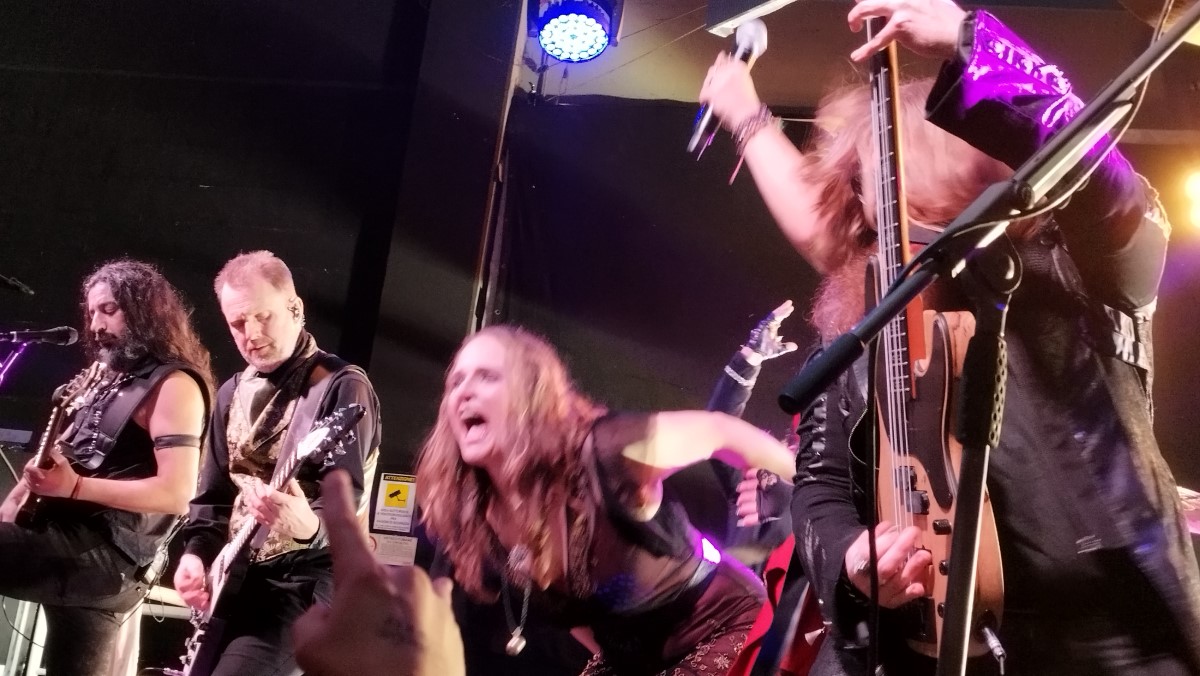
Tomaz: Yes, and by doing that, you influenced many other bands, like, for example, Nightwish, who later became a huge thing...
Christofer: Yes, they admitted that they were listening a lot to the Lepaca Kliffoth and Theli albums. Back then, they mentioned Therion and Stratovarius as their main influences. I mean, I got influenced by Celtic Frost, who made the first symphonic metal songs, but they never made a symphonic metal album. I made the first symphonic metal album. The term symphonic metal, I think, was invented by me accidentally. Before the album Theli, nobody gave a shit, we didn't sell many records, and we only had some interviews in underground magazines. They considered us a kind of avant-garde death metal band, but when we made Theli, things drastically changed. So, back then, one German journalist asked me how I defined my music. I had no idea; I'd never thought about it, so I said, "I guess it's some sort of a symphonic metal of some kind or something". Then the headline in that magazine was: Therion - symphonic metal. It was the first time I saw that written. For me, it was just a way to describe it, but that's how the name came up actually. I guess that the German magazine invented it - they wrote "symphonic metal" because I was describing the music - not giving it the label - they did it.
Tomaz: This might be a stupid question... Anyway, of the many albums you've released, which one are you most proud of?
Christofer: I'm proud of all of them - in different ways. In a way, I could say that I'm most proud of Vovin because it was basically my solo album. I went into the studio with musicians who weren't even metal musicians. I had never seen them before, and they had never heard of Therion. They never heard the songs they were supposed to record. The drummer came, and I showed him the song, written on a piece of paper; he went into the studio to record it, and then the bass player showed up. I taught him the song, he wrote it, and so on.
Tomaz: Vovin is considered one of the crucial metal albums in general, and I agree...
Christofer: It's the best-selling Therion album by far. It has also the highest number of streams. On that album, I recorded almost all of the guitars by myself. I only took in a friend to help me with a few things. I had singers that I'd never seen before. I made that record totally by myself. I had no band at that time since everybody had left. I had the songs and a record deal, so I thought, "Why not make a record and try to recreate a band later on?" In one way, I can say that I'm most proud of that one because it was just me, and I couldn't rely on anybody else. I'm also very proud of Lemuria and Sirius B because I used that huge orchestra for the very first time. Before that, we recorded section per section; we didn't even record the entire brass together. It was not very stressful to do that; we even had our own studio when we recorded Secret Of The Runes, so things were quite easy. When we recorded the orchestra for Lemuria and Sirius B, I went to the Czech Republic. We had this orchestra of almost 100 people there at the same time. It can be very expensive if you waste time and don't have your shit together when doing such things, haha. I'm self-taught; nobody taught me anything about music. I remember buying a book, not about songs, but about instruments in general, to see what tones certain instruments could play, how to write notes and things like that - technically, it was a basic ABC about it. So, I bought that old book from the 60s because it was cheap, haha. I started with simple things like strings and vocals. Never mind, so, back to the topic. When I went to the Czech Republic to record, I had 300 pages of score with me that I carried in a paper bag. I only hoped that everything was good and that if something was fucked up, it could cost me a fortune. Fortunately, out of 300 pages, there were only two mistakes. I even remember one of them - the oboe and bassoon can play many of the same notes, and I have somehow swiped them for some reason. It didn't sound good, and then the conductor gave me some advice, and I fixed it. It was very stressful to do it, but on the other hand, it was extremely powerful to see so many musicians playing something that you had written. I came with no formal musical education, with those papers in a bag, and then this famous orchestra played it. It was bombastic.
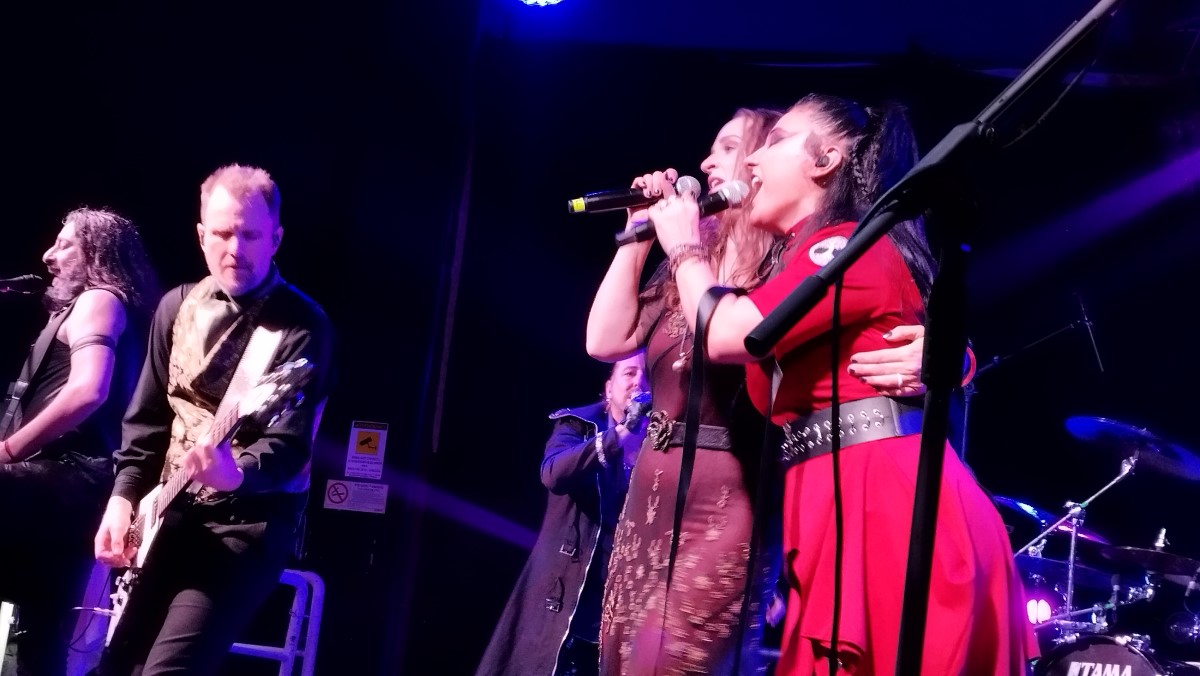
Tomaz: You must have had some shivers down your spine...
Christofer: Totally! Like "The Blood Of Kingu", the end of it, that really powerful forte, fortissimo,... That was one hell of a powerful experience. I'm really proud that I pulled it off. It could be a disaster as well. Fortunately, it wasn't.
Jerneja: It will soon be 30 years since the release of Vovin. Have you considered re-releasing it or releasing a live version of it?
Christofer: How the time flies, doesn't it? No, but we already played the whole record live. I don't like playing the entire record; it's boring. I prefer to make a set that is interesting. We did it with Vovin, we did it with Theli, with Secret Of The Runes, because we were paid extra for that. If people really want it, give us some money, and we'll do it. I don't know, I don't want to do that sort of stuff. Back then, we were dependent on money, so it was ok. We could then pay the rent, so "let's do it". We liked the record, so why not? Now I'm in the position that I don't need to play live at all, so then I'll do it how I want it. If people don't like it, they can stay home or buy a ticket and see us play. The re-issue has already been done, and I don't see a reason to do it again. Right now, the market for CDs and vinyl records is very small. We already made so many colours - maybe we should make a pink one this time, haha. We've already had so many versions. There's so much circus around that stuff. Mina, my girlfriend, who is taking care of our social media, often suggests making some different versions. Yeah, we did 19 records - and that way - we can have an anniversary every month. I don't want to hear any more about it. Maybe when it turns 50, yeah, we can make something, but then again, some other record will turn 40, and another 30, and so on.
Jerneja: Yes, but Vovin is legendary...
Christofer: It's true, but then you have someone who will say Theli is the one and another who will say Of Darkness is... the real deal because it's our first record. Too much circus for me. Also, when I turned 50, I didn't make a big deal; it's just age, just a number. I don't feel different being 52 or 51 or 49.
Tomaz: You also did ABBA's "Summernight City" cover, released as a bonus track on the Secret Of The Runes album. How was it received at the time, since not many metal bands dared to do something like that?
Christofer: The song was recorded for an ABBA tribute by metal bands. The whole idea was based on metal bands playing ABBA. Nuclear Blast was really cool. It released a lot of tributes for all sorts of things. There were also tributes for other metal bands like Judas Priest, Scorpions, and Iron Maiden. Then they made a tribute to Thin Lizzy and started to get away from metal into traditional rock until somebody came up with an idea to do it for ABBA. Many bands said that they loved ABBA.
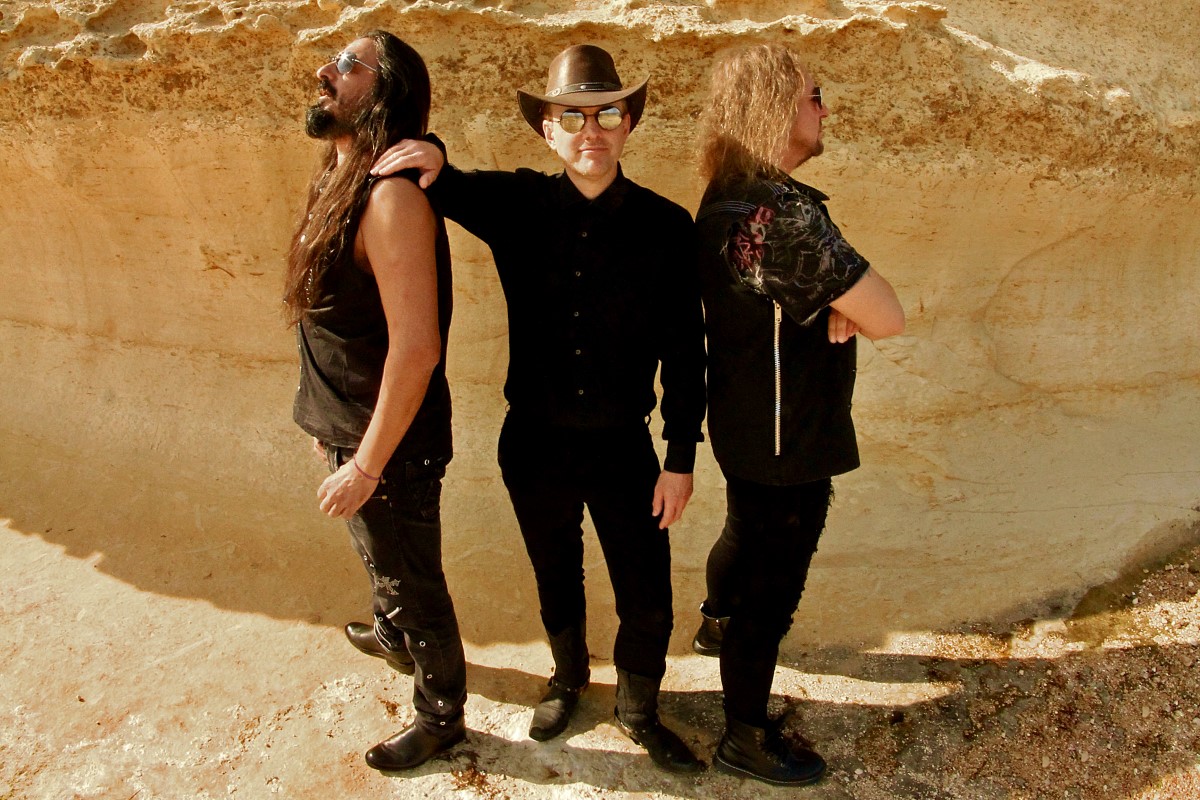
Tomaz: Yeah, but it was different back then. As a metalhead in the late 80s or early 90s, you were almost not allowed to listen to such stuff. Today is different, as many metal musicians and fans listen to pop music, 80s disco, new wave and such stuff, and are not ashamed to admit it...
Christofer: I don't wonder why. They even play pop music but with heavy guitars. A significant part of today's metal bands that I hear is pop music. It sounds like 90s guitar pop but with heavier guitars, heavier vocals or female vocalists. Take, for example, the band The Cranberries; you can just prank up the guitar, and you have a metal song. Metal has become very commercialized lately. I'm not complaining or anything - so that there would be no misunderstanding or something - because I like commercial music. It's just a matter of definition. For me, metal is defined by riffs, but today is different, and many metal bands don't sound very different from pop bands.
Jerneja: And which bands do you like to listen to these days?
Christofer: I listen almost to the same music as I did years ago. 80s heavy metal like Accept, Judas Priest, Iron Maiden, Motorhead, Manowar, and such stuff. I like 70s rock'n'roll in general, things like Alice Cooper. I'm a huge fan of Uriah Heep, Deep Purple, and Black Sabbath. I like symphonic rock bands from the 70s, such as Jethro Tull, and I'm a huge Jimi Hendrix fan. Bands like Mountain and some obscure bands from the 70s that you've probably never heard of, like Klaatu. And Voivod, of course. I'm a big Voivod fan. I think they are the only band that sounds somehow modern.
Tomaz: What about your label, Adulruna Records? Do you have any plans to release something new?
Christofer: It's mainly to release my own stuff and some catalogue things when I get the rights back from the label. Usually, you sign a ten-year contract and then get the rights back. I don't need a record label for that. With streaming? Why would I sell that to a record label? In the best case, they take 50%. If somebody streams Vovin today, I don't need to promote that record, just like you don't need to promote Iron Maiden's The Number Of The Beast. If people want to listen to it, they can listen. So, I don't need a record label to be between me and Spotify and take all of the money. I mainly have Adulruna to own intellectual properties of my own records if I put them up for streaming. Also, physical releases I prefer to sell myself; I only license them from somebody else.
Jerneja: But you do this mainly for the Latin American market?
Christofer: Yes, I did this for Leviathan III, but in most cases, I made licenses. I released the first four albums, but that was a spontaneous thing. Then there was this Russian band, Arcane Symphony. I don't even know how I came across it. I guess they wanted me to hear their record and give some opinion. It was a good thing, but the girl spoke terrible English. Their translations were bad, and the lyrics weren't very good either. I said it would be really difficult to make it this way. Then I spoke with the main guy in the band, the keyboard player, and told him that if somebody would re-record this, with new lyrics in English, there would be a chance of selling it. It was just a spontaneous thought. Then I checked up with Lori Lewis, and she liked the idea of doing it. That way, Lori Lewis' solo album Carmina Romanus was born. The album didn't do very well, but on the other hand, look at Mats Levén, who did a solo album under the name Skyblood. He signed with Napalm Records. I saw cover stories in magazines and shitloads of advertisements; they pushed the album a lot, but still, Lori Lewis' album is doing at least twice as good just in streaming. It shows that the content is more important than anything else. Sometimes some say, as an excuse, that a thing wasn't promoted well, but maybe, if they had sellable content, it would be good. Mats Levén's solo album is not bad, but I understand why it's not doing well. They pushed it like hell, and we did the opposite with Lori. The Covid was just arriving, and they locked down everything. We couldn't even ship the CD; it was that bad. There was nothing we could do except open the door and kick out the album, haha. The album was out digitally, and later, we did some physical copies for those who still wanted it. Those two records are a really good comparison, and good music won the battle.
Tomaz: I interviewed Lori Lewis right after her concept album, Carmina Romanus, came out (the interview is HERE)... And where do you see Therion ten years from now?
Christofer: Ten years from now, haha, probably we will make a couple of albums more, and maybe we will be on tour again. We will be doing it until I'm at least 70 years old. Looking at many of my heroes, Klaus Meine (Scorpions) is 75, and Brian Johnson of AC/DC is 76, btw, I'm a huge AC/DC fan. If they can do this kind of music at their age, why wouldn't I be able to do it when I'm 75? I'm sure I can do writing and recording until I'm 80 years old, and I see myself performing until I'm 70. Probably, there will be less touring, and I will play worse. I guess we'll be less wild on stage, but who cares?
Tomaz: Some time ago, you moved from Sweden to Malta; how did that happen, and how do you like it there?
Christofer: Because Sweden is a sinking ship. And I wanted to get out of there before it's just me and the rats left. Put it this way. Naples (Italy) used to be a nice city once, right? I remember going there with my parents for vacation; it was very nice, but it's not that nice there anymore. What happened to Naples happened to Sweden is a short answer. Nobody in the right mind would still want to live in Sweden, it's a shithole country. I mean, Paris has been destroyed, and London, Marseille is a shithole of Europe, Naples has been destroyed, and Rome used to be much nicer also. There's a lot of criminality and other shit there. Sicily used to be a very nice place, too. You should know what I'm talking about, right? But in Malta, I've never locked my car there. I even left my iPhone on the seat - it happened twice - when I was coming home very late from the airport, and I just took the bag and left the phone in an unlocked car in the street. It was still there in the morning.
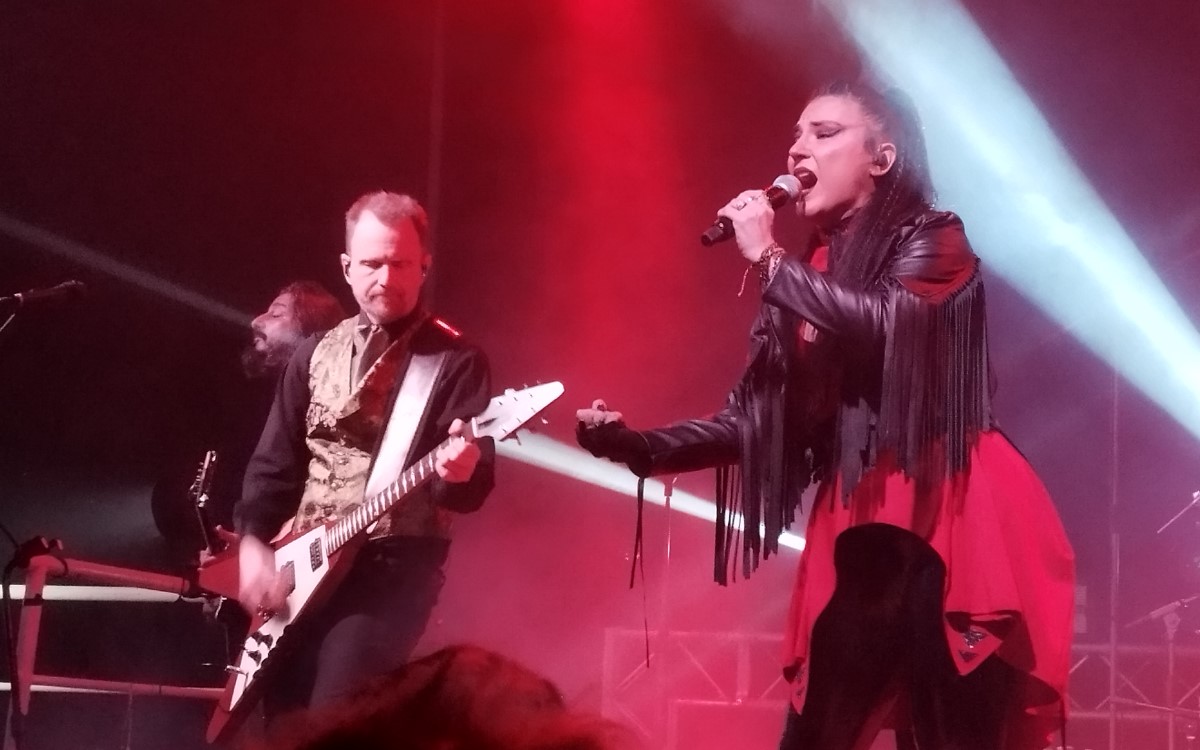
Jerneja: Like in Laibach's song "Eurovision", quoting: "Europe is falling apart".
Christofer: Yes, exactly. Oh, and I love Laibach. They played in North Korea, which is a very interesting thing.
Jerneja: It looks like this will be the longest interview Terra Relicta has ever done, haha. Thank you very much for your time and explicitness, Christofer, and for being straightforward. It's nice talking to you, so if you want, we might as well continue...
Christofer: It has been more of a conversation than a real interview, don't you think? Nevertheless, thank you for coming today; maybe this one will be the last show in the area, at least for a while, since we'll cut down on touring. Next time we will be touring in Europe, there will be maybe just seven shows. We will not play in France, for sure, because it has insane tax rules. We had to pay 53% tax when we last played there, and we still have to pay tax in our home county out of what is left, so in the end, taxes are around 75%, which is nuts. So, if you don't do France, you can't do even Spain and Portugal. If you asked me 15 years ago about France, I would say that I loved it and we had some of the best shows there, but now I don't want to put my foot in. Maybe it will change, and ten years from now, they will have a cultural minister who is not a complete idiot. In Paris, we always had some of the best shows, but not anymore - with these insane rules. We don't want to do the UK either because of all the hassle there and with all the paperwork you need to do for the equipment and people. We will play in the countries where we do well and where there are no insane rules and artists' taxes. It's unfair to be taxed twice! It's not about the money; it's about the fairness. I can play for a bottle of beer if I want to, but it's not right. The only way to stop that is for everybody to stop playing in such countries. We will definitely do Poland and Romania because they have no artist tax, just some paperwork to prove you are an EU resident. We will maybe do The Netherlands, but for the rest, we will see. Germany was in the 90s when we started touring, the biggest market. We always did between 12 and 16 shows in Germany alone. Now, we have a maximum of three shows just because we cross the country. But things can change. When you tour in the West, you can't help but notice how it gets worse every year. Each time it's dodgier and more crime. In the East, it's the other way around. It was totally dodgy and shitty when we started touring. Just imagine how it was with those old communist theatres and such stuff, and the food was really bad, but the audience was always amazing. Look at it now, how it has changed for much better. Some of the best food we ate was in Eastern Europe, while in the famous Paris, we ate some kind of pig food. In the East, they have fixed almost all the roads; they have new venues and fresh backstages, and everybody speaks English. The world's worst backstage room was in Madrid. It was almost like being in jail, no, in jail, it would be nicer, honestly. In jail, you'd at least have a toilet that works. Some don't understand that we have to be in such a place for the whole day; we don't have anywhere else to go. Then, in Germany, at one venue, it was so very stinky; something was wrong with the sewer in the shower, like really wrong. I remember playing at that same place in the 90s, and the lock for the shower was broken. You know what, it's still broken. Everything is just falling apart, and nobody cares. The only thing that they know how to do is to add taxes. There were no artist's taxes in the '90s, but now, in the West, you have those everywhere, while not in the East. So, why should we tour in Western Europe? For 50 or 100 people? In the very best case for 300 in Germany? If you love touring, you can do it and meet your fans, but if you hate touring like I do, why do it?
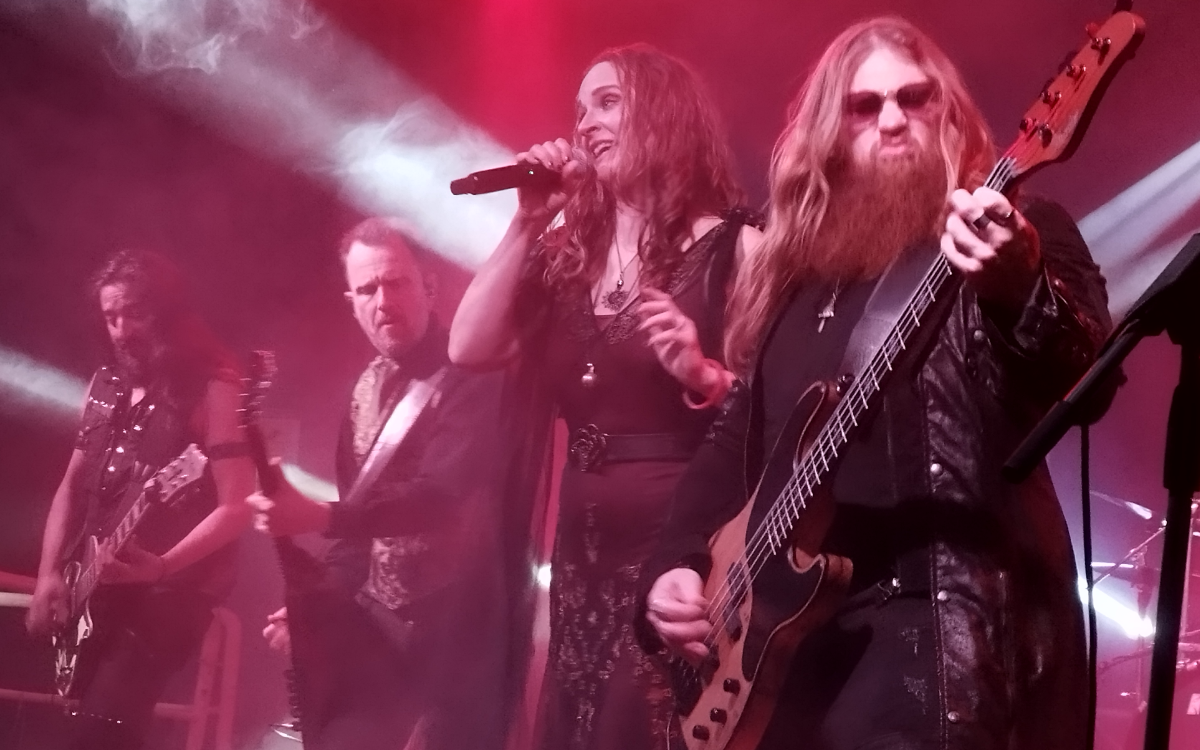
Tomaz: Will you play at some festivals this summer?
Christofer: Maybe once per year, we'll see. Festivals are so much work, you know. We have a guitar player from Argentina, a singer in the USA, a bass player from Sweden, another two singers are from Spain, and I live in Malta. They need to fly to Malta, and then I have to host the entire band for some days, which is fun but also a lot of chaos. We have to rehearse for a few days. They need to practise all the songs just to do one show. Then we do that one show, and everybody flies back from where they've come. For all these flights and everything, you need an insane amount of money, so this excludes most of the festivals. You have some well-established big-name festivals like Wacken, for example. They offer you half or one-third of the money that you are worth. That's because they pay the main artists a lot. Medium artists are on such festivals brutally underpaid, while small artists don't get any payment at all, and artists who don't have an established name have to pay to play. I'm not complaining; it's their festival and their rules. I'm just saying that it doesn't fit my concept. My concept is that I want us to be paid what we are worth.
Tomaz: Thank you again, Christofer, and say hello to your girlfriend, Mina Karadžić. Years ago, I was in contact with her for the Luciferian Light Orchestra interview, if you recall (the interview is HERE). It was around the release of its eponymous debut album. By the way, what's going on with this side project of yours? I know you released two EPs since, the last one, Where The Lilies Grow, two years ago...
Christofer: I'm working on a second album, which will come out via my label. You can expect some news soon.
Jerneja: Again, by the way, Mina Karadžić sounded familiar to me, so I googled it, and sure enough, Mina Karadžić was also an Austrian-born Serbian painter and writer who lived in the 19th century. She was the daughter of Vuk Karadžić, one of the most important reformers of the modern Serbian language.
Christofer: Exactly. The man who invented the Cyrillic alphabet, I mean the Serbian version of Cyrillic. He was a national poet as well. And, the same family name as Radovan Karadžić had, haha. Something that you want to point out when you enter Croatia, haha, and when you show them the passport. They will probably say, "oh, an interesting name you have".
Live photos by Tomaz
Therion links: Official website, Facebook, Instagram
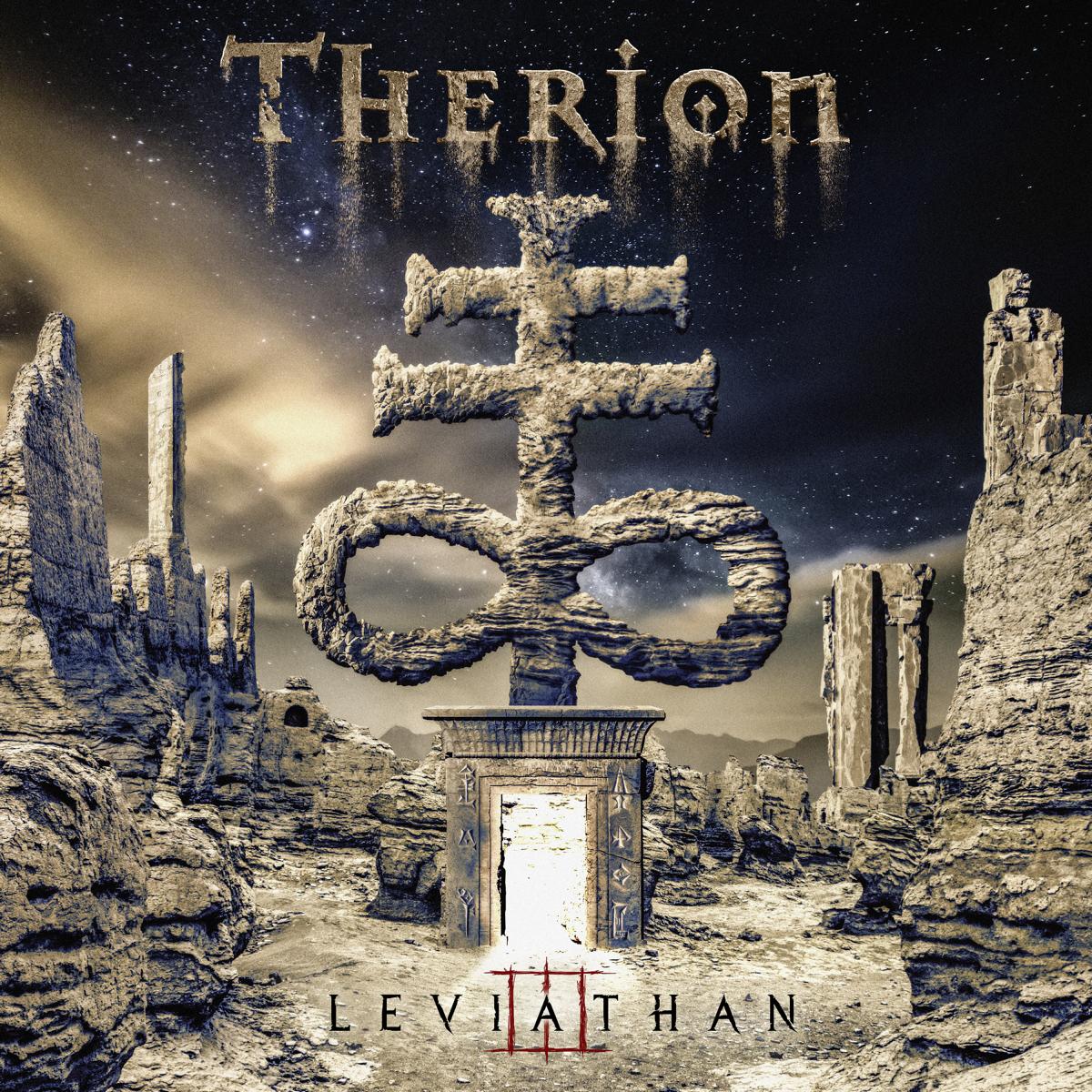


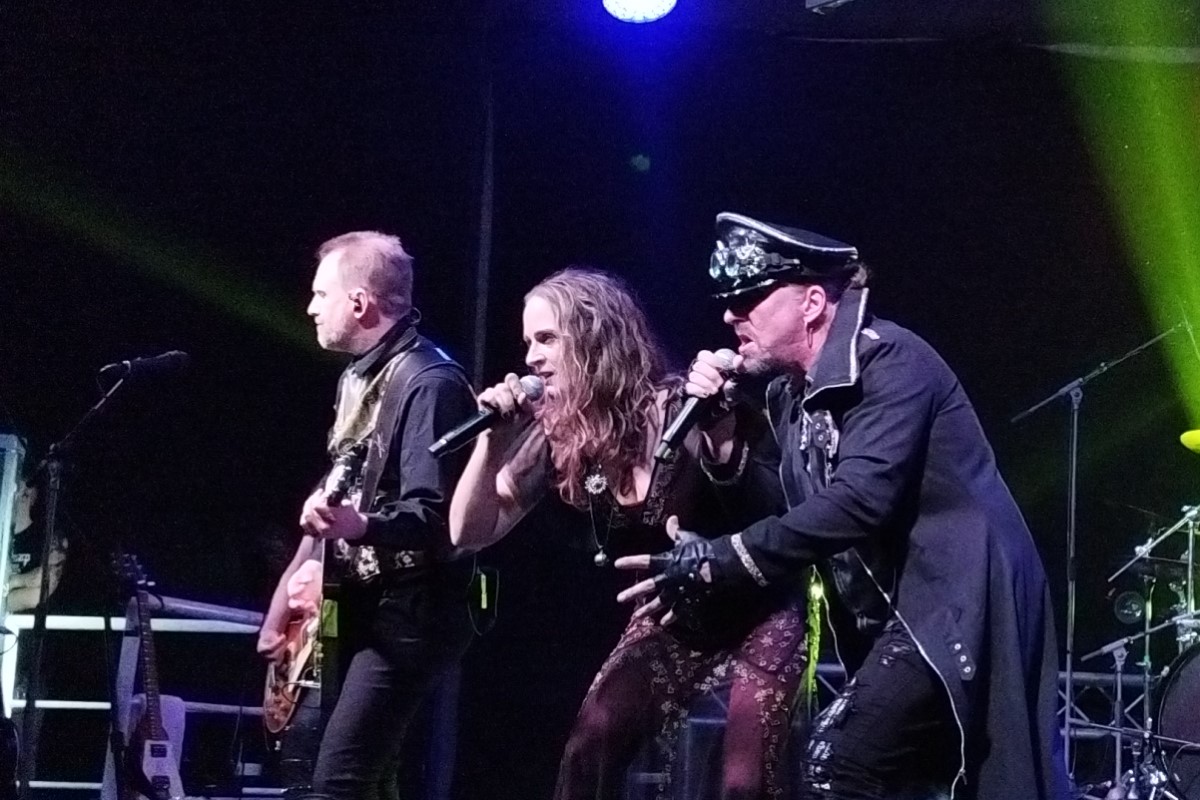 "There were already bands doing small illustrations of symphonic metal, and I was thinking, why doesn't someone do this all the time?" - Christofer Johnsson
"There were already bands doing small illustrations of symphonic metal, and I was thinking, why doesn't someone do this all the time?" - Christofer Johnsson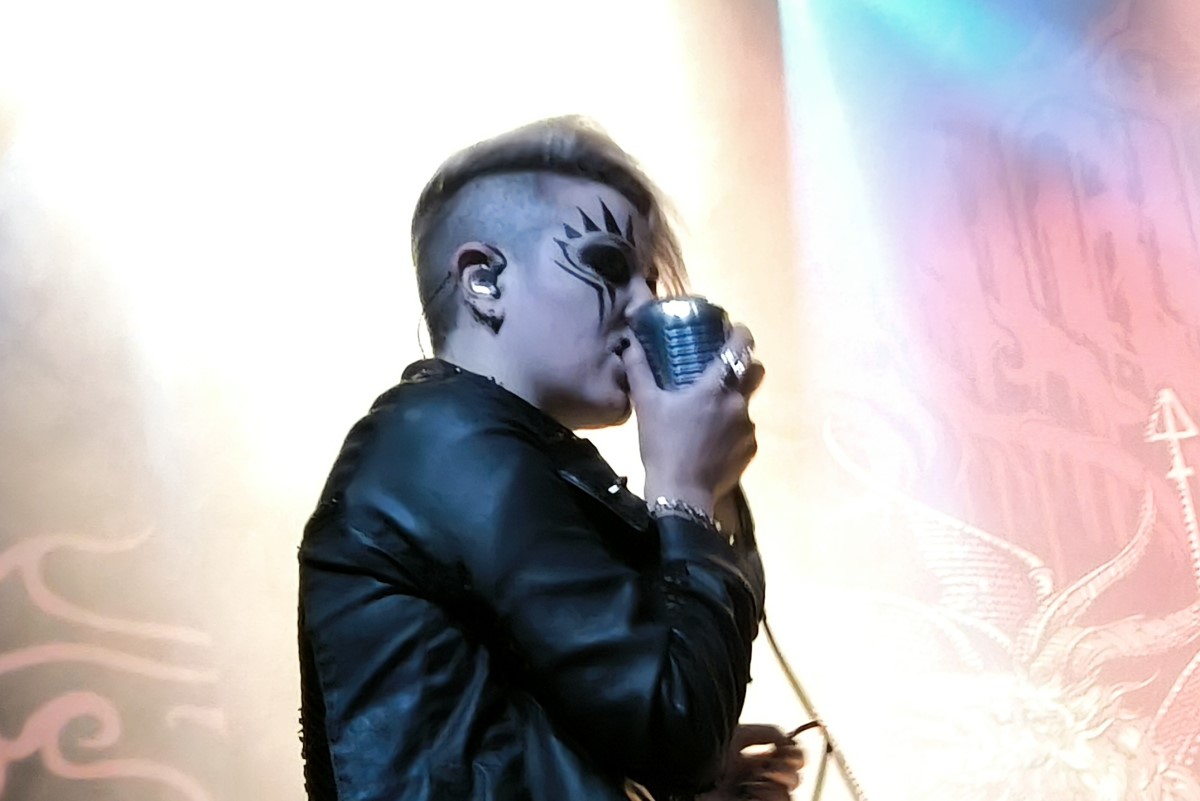 "We were kind of exploring dark subject matters and darker sounds. I really like that, and this is the direction we are going right now." - Larissa Vale
"We were kind of exploring dark subject matters and darker sounds. I really like that, and this is the direction we are going right now." - Larissa Vale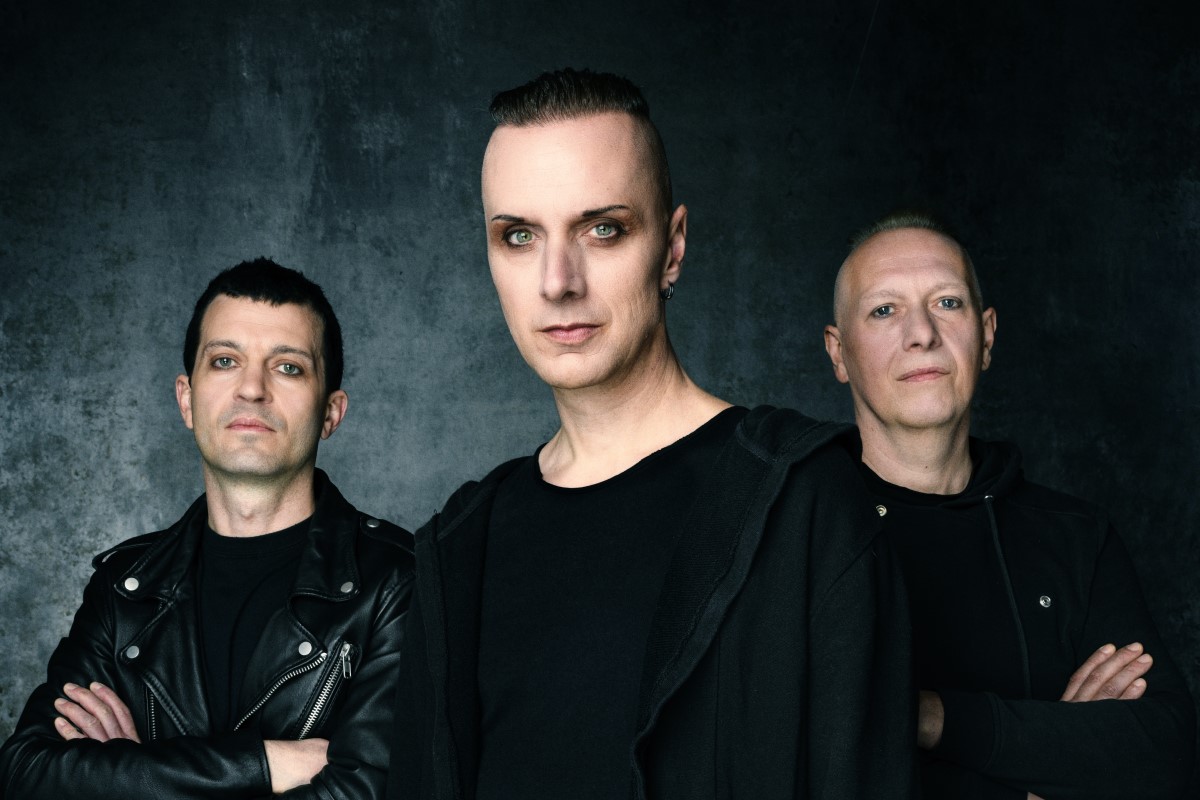 "I don't tend to judge people, but I do judge them if they're too lazy to engage in independent thought or if they're simply careless and don't consider the consequences..." - Sven Friedrich
"I don't tend to judge people, but I do judge them if they're too lazy to engage in independent thought or if they're simply careless and don't consider the consequences..." - Sven Friedrich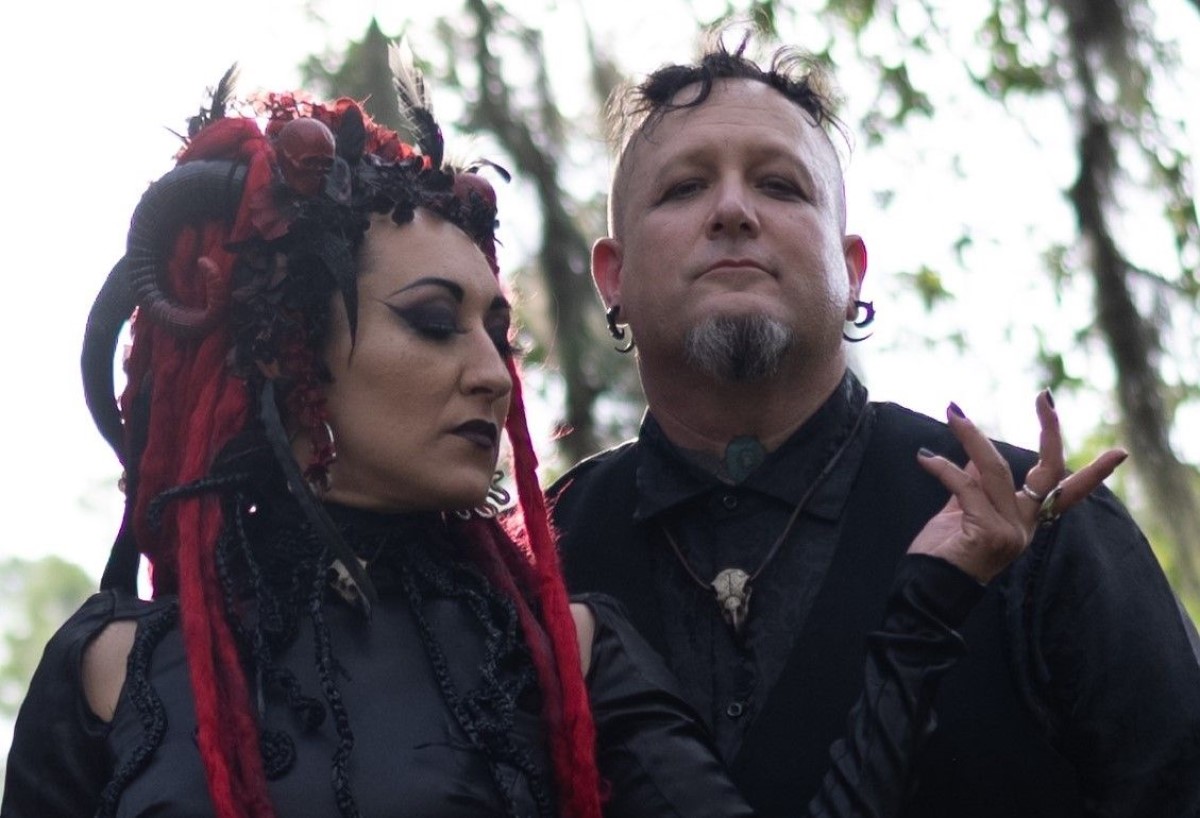 "We paused our work as I was grieving heavily, but once we returned to it, things took on a whole new meaning." - LV Darkling
"We paused our work as I was grieving heavily, but once we returned to it, things took on a whole new meaning." - LV Darkling